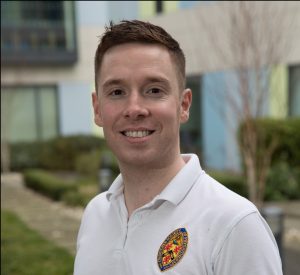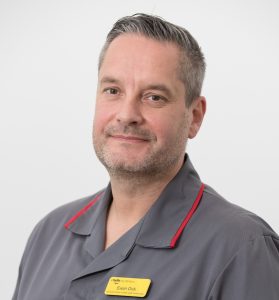Paul McCallion is an advanced physiotherapist at Newcastle’s Freeman Hospital where he specialises in respiratory conditions and in particular bronchiectasis – a long term condition that affects the airways in the lungs.
Affecting over 300,000 people in the UK alone, bronchiectasis causes widening of the airways which can become inflamed with thick mucus. This is often difficult to clear leading to problems such as chest infections, breathlessness, fatigue, anxiety and even depression.
Paul has recently been awarded a NIHR Doctoral Clinical Academic Fellowship which will provide the support he needs to conduct research into bronchiectasis with a focus on shared decision making, working collaboratively with patients to develop non-invasive techniques to clear the airways.
Increasing research impact whilst strengthening academic links
The highly competitive and prestigious fellowship was awarded by the National Institute of Health and Care Excellence (NIHR) and is funded by Health Education England (HEE) through the Integrated Clinical Academic (ICA) Training Scheme.
The fellowship is being hosted by the Newcastle upon Tyne Hospitals NHS Foundation Trust working in close partnership with Newcastle University, as part of the Newcastle Health Innovation Partners (NHIP).
This is a partnership bringing together Newcastle upon Tyne Hospitals NHS Foundation Trust, Newcastle University, Cumbria, Northumberland, Tyne and Wear NHS Foundation Trust (CNTW), Newcastle City Council, and the Academic Health Science Network for the North East and North Cumbria.
Paul explains what he hopes to achieve through his Fellowship. “Airway clearance techniques are ways to aid coughing to clear mucus from the lungs. Research shows patients with bronchiectasis who do not perform any airway clearance techniques have worse health outcomes including more chest infections, than those who do perform one.
“However, there are many techniques with little evidence to say which one is best for patients. The best may be the one that the patient commits to and uses most regularly.”
Supporting patients to self manage their condition

A passionate advocate for his patients, Paul adds: “I’ve listened to my patients and other people living with bronchiectasis in the UK.
“Many voiced the unmet need for research in the non-pharmacological management of bronchiectasis, specifically around airway clearance.
“I want to improve patients experience and outcomes in bronchiectasis, to optimise their self-management strategies for airway clearance techniques – the cornerstone treatment for bronchiectasis.
This Fellowship will allow me to research all aspects of bronchiectasis that are important to our patients.
Physiotherapist Paul McCallion
This research project will be the first co-produced (with patients, physiotherapists and national charity leads) shared decision-making intervention for patients with bronchiectasis.
The findings from this research will be essential in ensuring patients are actively involved in deciding their physiotherapy treatment for bronchiectasis.
Paul adds “This research has the potential to improve adherence to airway clearance techniques, quality of life and long-term health for patients with bronchiectasis.”
A research journey full of mentorship and collaborative support
Paul says that there are a number of people and networks who have supported him so far in obtaining this fellowship, including his supervisors: Professor Anthony De Soyza, Professor Judy Bradley, Dr Joanne Lally and Dr Lisa Robinson, as well as the Trust’s lead for NMAHP research Dr Linda Tinkler and the wider team and line manager Jennifer Glennie.
He also cites support from charities pertaining to his specialist field such as Asthma and Lung UK and Primary Cilia Dyskinesia UK alongside local networks; the Research Design Service North East & North Cumbria (RDS NENC) and the Newcastle Health Innovation Partners (NHIP).
“This group of individuals and charities will play an essential role in the development of my research, academic and leadership skills,” explains Paul.
“They will support me on rationale and theoretical stance for the proposed methodology and will promote critical and analytical thinking to explore the underpinning theory. They will also develop my skills in co-production as well as a wide range of trial designs (RCT, observational).”
He adds: “Importantly, my supervisors and NHIP team understand the operational oversight of the evolving landscape in relation to AHP clinical-academic careers, and they will support me with competencies and challenges associated with navigating and developing this role during my fellowship.
“Finally – my first research “taster” session was led by Dr Niina Kolehmainen in 2017. Niina was an inspirational speaker and facilitator and her email to me after that session ignited my research spark and opened the door to other mentors and research leads in my field.
“I want to thank her for that.”
Healthcare at its best with people at our heart

Associate director for therapy services Ewan Dick is delighted to see Paul win this award.
He says “Shared decision making and self-management are at the heart of patient-centred and personalised care and these are important themes that we want to develop further across Therapy Services.
“It will be fascinating to see Paul continue to develop this important area of research, which already is recognised internationally and how it can contribute to improving clinical care and self-management for patients with bronchiectasis.”
Fostering innovative clinical academic careers
A key priority for our NMAHPs Strategy is to increase research opportunities and impact whilst strengthening our academic links.
We do this in Newcastle by fostering innovative clinical academic careers and attracting external funding and national fellowships through our unique mentorship approach and collaborative working.
Professor Dave Jones, Director of NHIP Academy, said: “Paul is part of the next generation of clinicians developing careers that integrate research and practice to improve patient care. As a physiotherapist, his success speaks well of the past decade of investment by organisations in Newcastle, to widen research opportunities across all professions.
Developing and retaining talented people like Paul is important for the health of the people in the North East and we are delighted for his success.
Professor Dave Jones, Director of Newcastle Health Innovation Partners (NHIP) Academy
